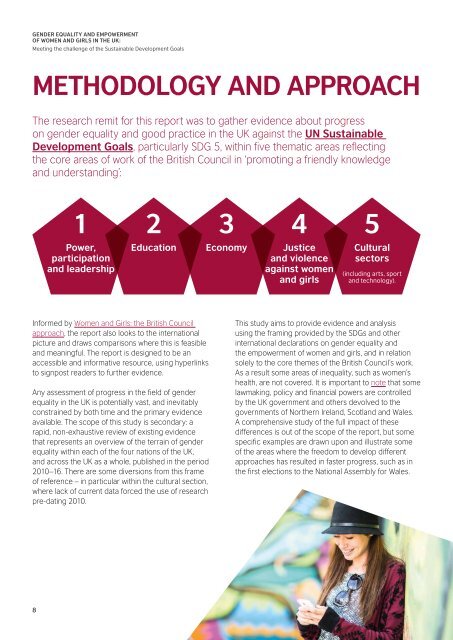GENDER EQUALITY AND EMPOWERMENT OF WOMEN AND GIRLS IN THE UK
gender_equality_an_empowerment_in_the_uk
gender_equality_an_empowerment_in_the_uk
You also want an ePaper? Increase the reach of your titles
YUMPU automatically turns print PDFs into web optimized ePapers that Google loves.
<strong>GENDER</strong> <strong>EQUALITY</strong> <strong>AND</strong> <strong>EMPOWERMENT</strong><br />
<strong>OF</strong> <strong>WOMEN</strong> <strong>AND</strong> <strong>GIRLS</strong> <strong>IN</strong> <strong>THE</strong> <strong>UK</strong>:<br />
Meeting the challenge of the Sustainable Development Goals<br />
METHODOLOGY <strong>AND</strong> APPROACH<br />
The research remit for this report was to gather evidence about progress<br />
on gender equality and good practice in the <strong>UK</strong> against the UN Sustainable<br />
Development Goals, particularly SDG 5, within five thematic areas reflecting<br />
the core areas of work of the British Council in ‘promoting a friendly knowledge<br />
and understanding’:<br />
1<br />
2<br />
3<br />
4<br />
5<br />
Power,<br />
participation<br />
and leadership<br />
Education<br />
Economy<br />
Justice<br />
and violence<br />
against women<br />
and girls<br />
Cultural<br />
sectors<br />
(including arts, sport<br />
and technology).<br />
Informed by Women and Girls: the British Council<br />
approach, the report also looks to the international<br />
picture and draws comparisons where this is feasible<br />
and meaningful. The report is designed to be an<br />
accessible and informative resource, using hyperlinks<br />
to signpost readers to further evidence.<br />
Any assessment of progress in the field of gender<br />
equality in the <strong>UK</strong> is potentially vast, and inevitably<br />
constrained by both time and the primary evidence<br />
available. The scope of this study is secondary: a<br />
rapid, non-exhaustive review of existing evidence<br />
that represents an overview of the terrain of gender<br />
equality within each of the four nations of the <strong>UK</strong>,<br />
and across the <strong>UK</strong> as a whole, published in the period<br />
2010–16. There are some diversions from this frame<br />
of reference – in particular within the cultural section,<br />
where lack of current data forced the use of research<br />
pre-dating 2010.<br />
This study aims to provide evidence and analysis<br />
using the framing provided by the SDGs and other<br />
international declarations on gender equality and<br />
the empowerment of women and girls, and in relation<br />
solely to the core themes of the British Council’s work.<br />
As a result some areas of inequality, such as women’s<br />
health, are not covered. It is important to note that some<br />
lawmaking, policy and financial powers are controlled<br />
by the <strong>UK</strong> government and others devolved to the<br />
governments of Northern Ireland, Scotland and Wales.<br />
A comprehensive study of the full impact of these<br />
differences is out of the scope of the report, but some<br />
specific examples are drawn upon and illustrate some<br />
of the areas where the freedom to develop different<br />
approaches has resulted in faster progress, such as in<br />
the first elections to the National Assembly for Wales.<br />
8


